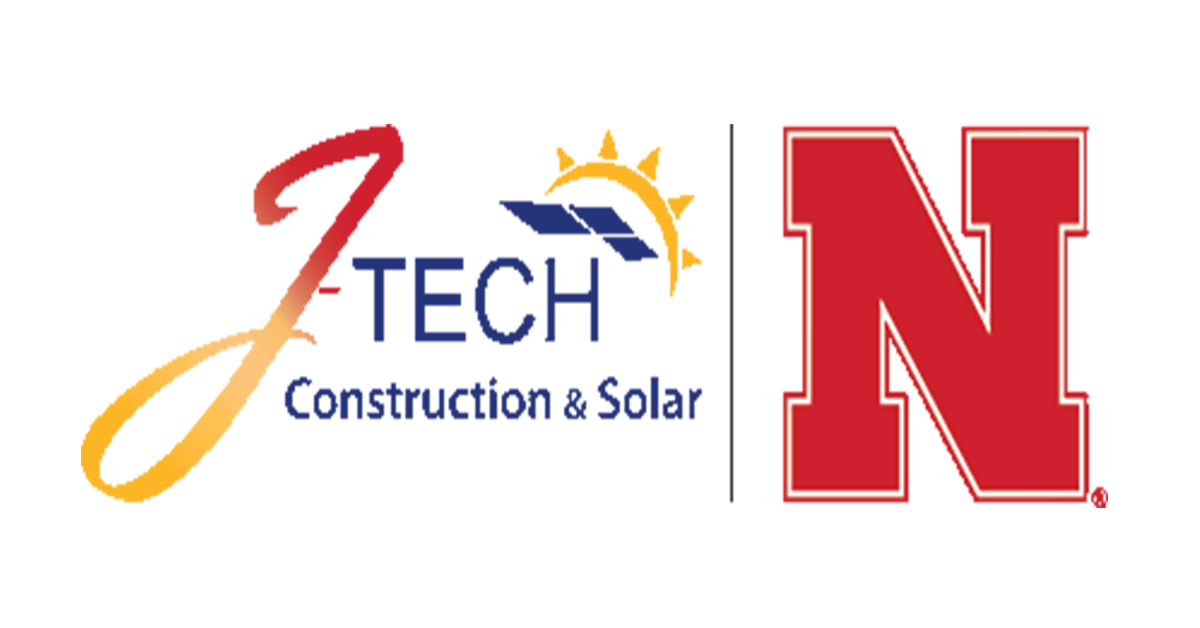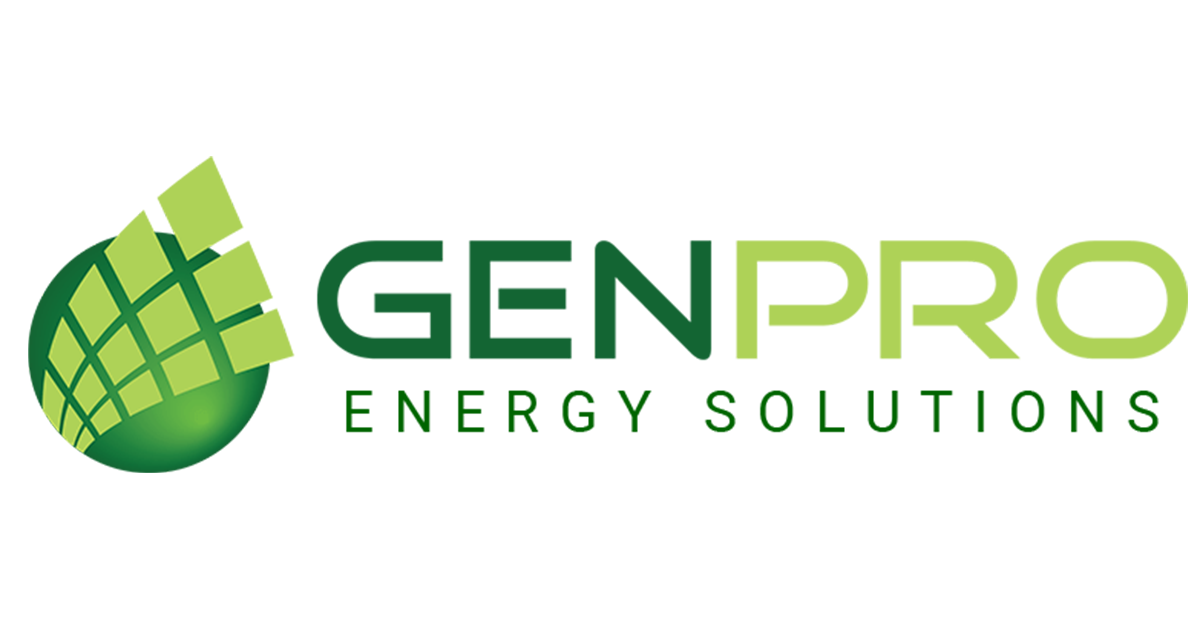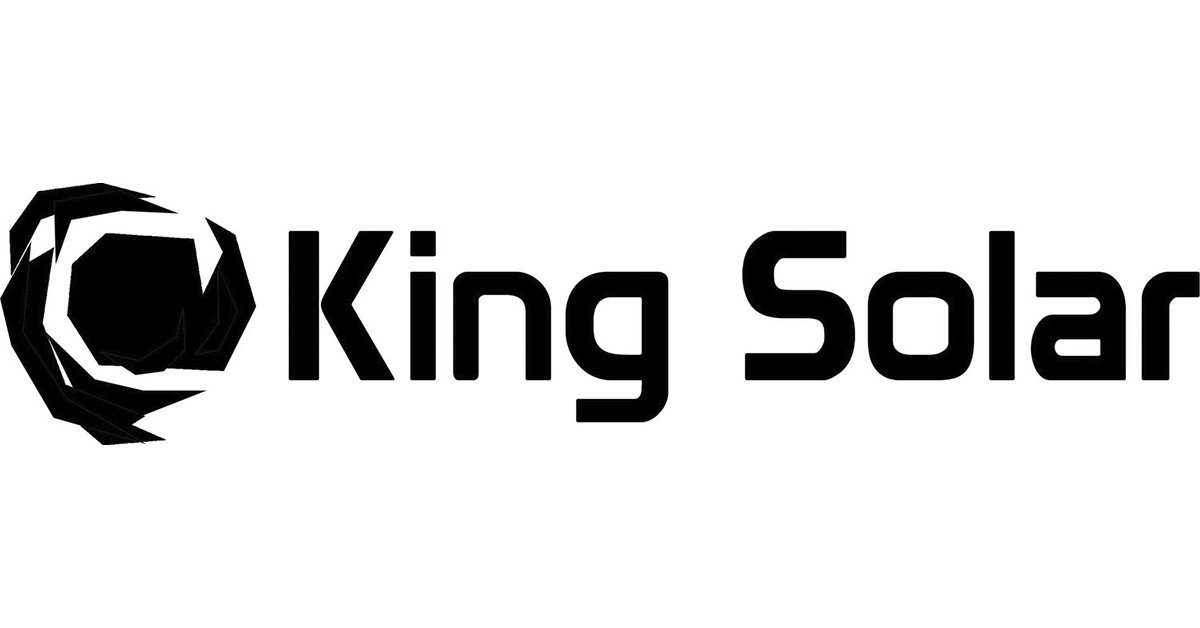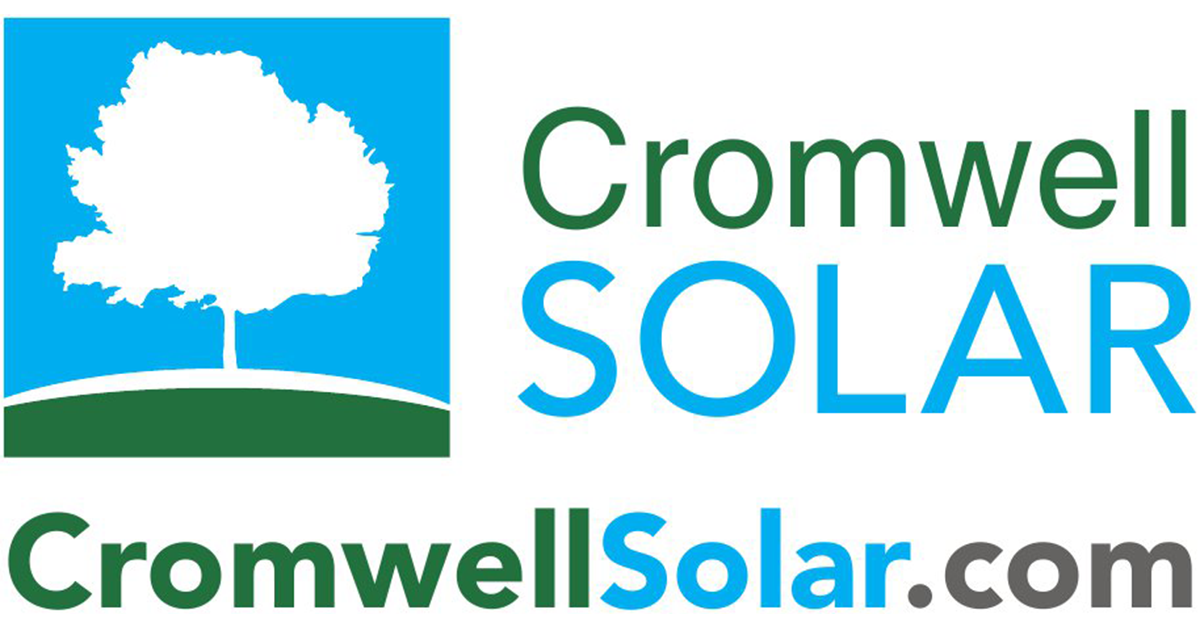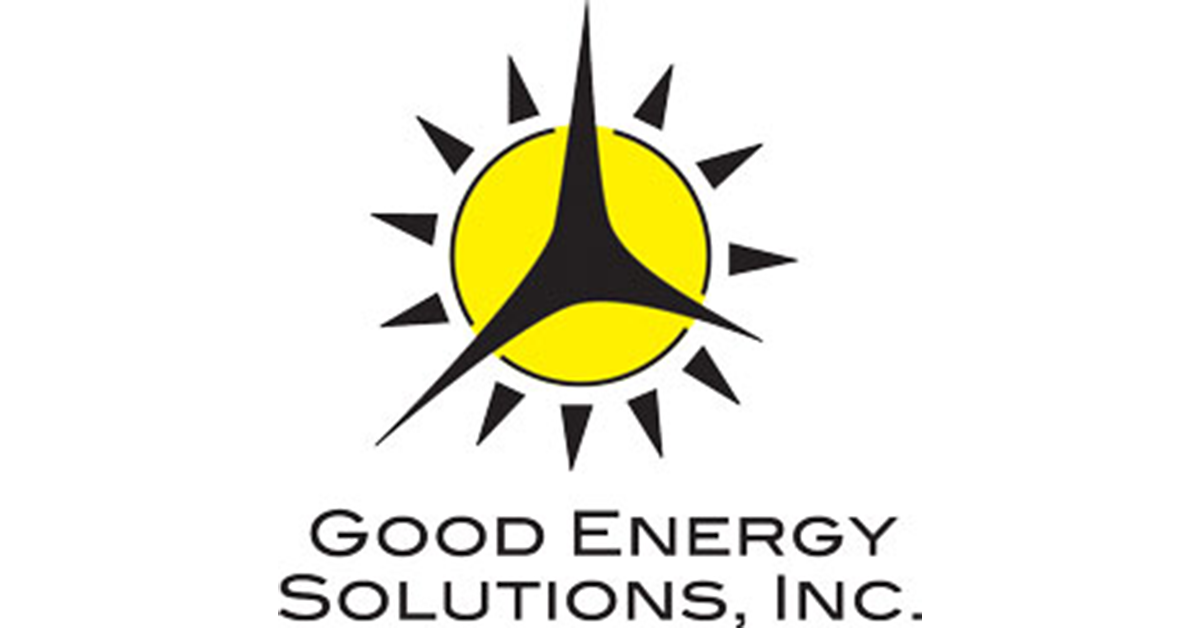Nebraska’s sunshine is a gold mine for solar potential. Take advantage of it with the right installer. We’ve sifted through data, considering Nebraska’s solar incentives and weather patterns. Our guide spotlights top installers, tailored for Nebraskans. From Omaha’s urban sprawl to the vast fields of the Cornhusker State, we match you with reliable solar solutions. We understand the importance of customer satisfaction and local expertise. Our recommendations are based on performance, service, and your feedback. Dive in as we navigate Nebraska’s solar installer landscape. Find out who can turn your solar dreams into a sunny reality.
Find the Best Solar Installers in Nebraska
We have compiled ratings of local solar installers in Nebraska and recommend proven solar panel installation companies you can trust.
Use the search form to find more local solar installers in your area. Enter the Address or Zip Code and choose the distance range from your location.
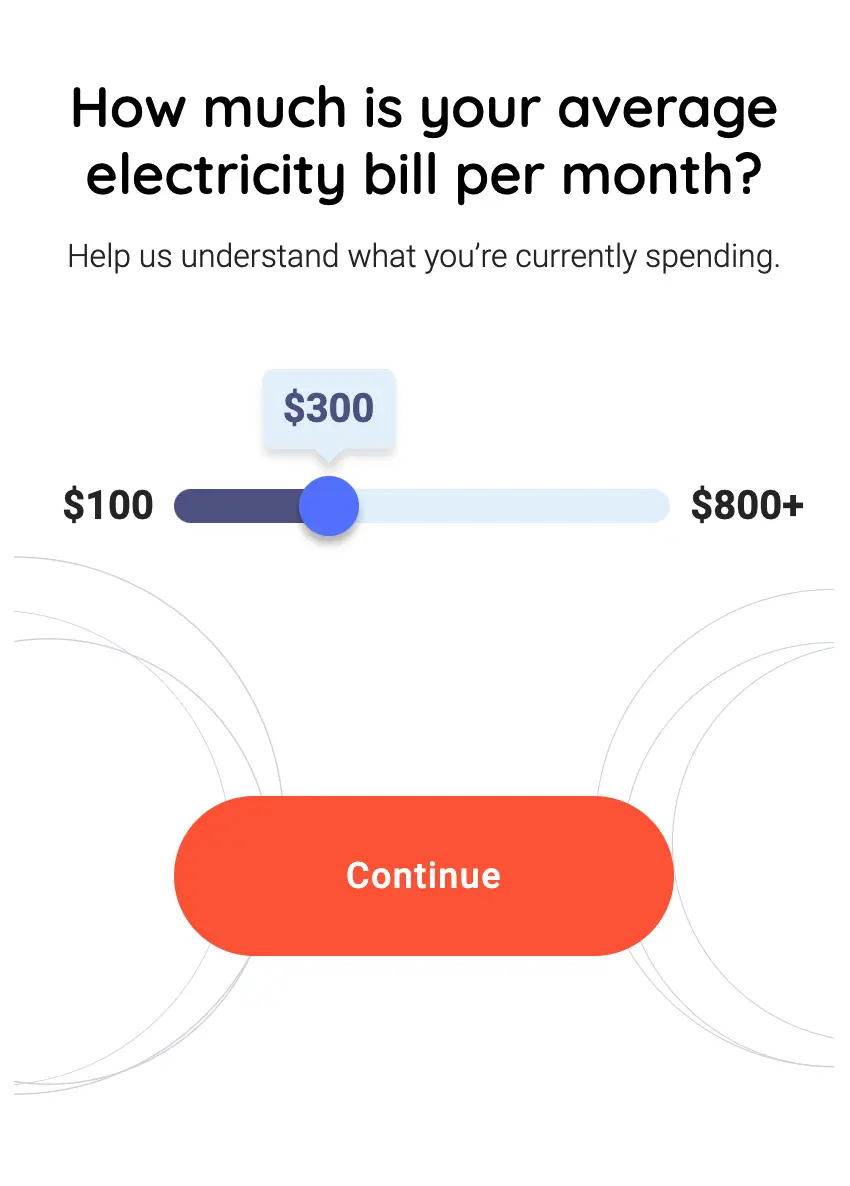
Why Go Solar in Nebraska?
Embracing solar power in Nebraska presents a golden opportunity to not only reduce your carbon footprint but also to capitalize on significant financial savings. The generous sunlight that graces the Cornhusker State allows solar panel systems to operate efficiently, delivering consistent energy production that can drastically cut down your electricity bills. With solar installation, you’re also hedging against rising energy costs while increasing your property’s value. Nebraska’s net metering policy works in your favor, enabling you to earn credit on your utility bill for excess power generated and returned to the grid. Add to this the availability of various incentives like federal tax credits and potential local rebates, and it’s clear that solar power is not just a step towards energy independence, but also a savvy economic choice for Nebraskans. Whether you’re a homeowner, business, or agricultural producer, the sun’s generous rays can be your ally in achieving both environmental sustainability and financial prosperity.
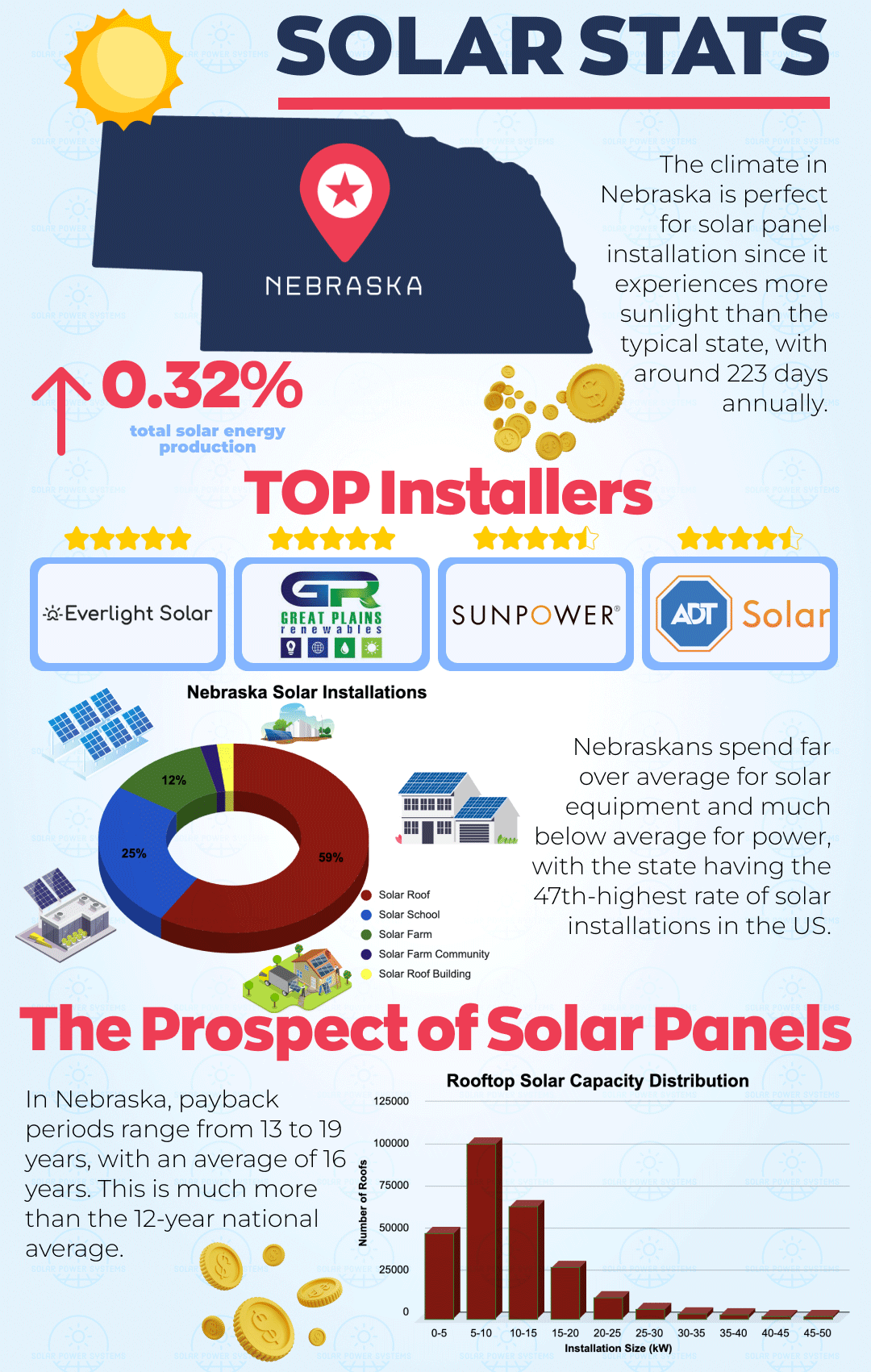
How Solar Can Save You Money in Nebraska
In Nebraska, the average cost of electricity might seem affordable when compared to some regions in the United States, but residents can still experience significant monthly utility bills, particularly in homes with higher energy demands. Currently, Nebraskans pay, on average, around 10.3 cents per kilowatt-hour (kWh), below the national average. However, with the typical household consuming hundreds of kilowatt-hours per month, these costs certainly add up over time.
This is where solar panels shine. By harnessing Nebraska’s ample sunlight, homeowners can not only reduce their energy bills but potentially eliminate them altogether. Let’s look at a typical case: A home in Omaha installs a 5kW solar panel system. With an average of about 4.5 peak sun hours per day in Nebraska, this system could produce an estimated 6,570 kWh of electricity per year. Considering the average annual consumption of a Nebraska household is about 10,896 kWh, the system could cover a significant portion of the homeowner’s energy needs. Taking the average electricity rate, this amount of solar production translates into savings of around $676 annually.
Furthermore, with net metering policies in Nebraska, any excess energy your solar system produces and sends back to the grid can earn you credits on future bills. Essentially, during sunnier days if your system generates more electricity than your home uses, the surplus is exported to the grid, and you get a credit that offsets the cost of power drawn from the grid when your system isn’t producing enough, typically at night or during overcast days.
While net metering policies vary across different utility companies in Nebraska, most of them offer some form of compensation for surplus solar generation, enhancing the return on investment for homeowners who decide to go solar. Keep in mind that understanding your local net metering policies is crucial when estimating your potential savings.
To ground this in real-world savings, consider a Lincoln homeowner who, after installing solar panels, reduced her electricity bill by 90%. Prior to solar, her annual electricity costs were around $1,200. Post-installation her costs dropped to roughly $120 per year, reflecting the direct impact of self-generated power and net metering credits combined.
In summary, with solar panels and net metering combined, Nebraskans can look forward to stabilizing their energy costs while making a positive environmental impact, a compelling reason to consider making the transition to solar energy.
Getting Solar Quotes in Nebraska
When embarking on the solar panel installation journey in Nebraska, the final solar quote you receive will be a comprehensive document detailing several cost components and financial metrics that are essential for making an informed decision.
The heart of the quote is the hardware cost, which covers the solar panels themselves, inverters, mounting equipment, and wiring. These costs can fluctuate based on the quality and efficiency of the solar technology chosen. Panels with higher efficiency might have a steeper upfront cost but can offer more savings in the long run due to better performance.
Installation fees encompass the labor costs for professional installers to set up your solar system. This is not an area to skimp on, as expert installation ensures your system functions optimally and adheres to all safety standards. Different contractors might offer varying rates, so it’s crucial to balance cost with the expertise and reputation of the installer.
Many quotes also include post-installation services such as system monitoring, maintenance, or additional customer support. While these services might increase the upfront cost, they can be beneficial for the long-term health and efficiency of your solar panels.
Warranty terms are another critical component. They protect your investment by covering potential equipment failures or performance shortfalls. The duration and coverage of warranties can impact the long-term value and peace of mind your solar system provides.
Understanding the payback period, which is the time it takes for the energy savings to cover the initial investment, is vital. This period can be influenced by your energy usage, the energy production of your solar system, and the prevailing electricity rates in Nebraska.
Financing options can affect your solar quote as well. Cash purchases, solar loans, and solar leases come with different financial implications, and choosing the right method can significantly influence your system’s cost and savings.
Performance estimates can guide you on how much electricity your system will generate, contributing to the cost-effectiveness calculation. This estimation should take into account Nebraska’s specific weather patterns, which can affect solar productivity.
State-specific regulations and incentives in Nebraska can favorably affect your final quote. The state offers the following benefits for solar adopters: – Net Metering, which allows you to earn credits for excess energy produced and exported back to the grid. – Federal Investment Tax Credit (ITC), which provides a significant tax credit for solar installations, although it phases out over time.
By comprehensively evaluating these factors, you’ll be in a solid position to assess the true value of your solar investment and proceed with a level of confidence in the sustainability and financial sense of your decision.
Why Hire a Local Solar Company in Nebraska?
Embarking on a solar project is an exciting venture, and opting for a local solar company in Nebraska provides a suite of advantages that ensure your project aligns with the unique solar landscape of our region. You’re not just purchasing a system; you’re benefiting from a partnership that deeply understands state-specific solar incentives, which can significantly reduce your upfront costs and enhance your long-term savings. Nebraska’s solar rebate programs, net metering policies, and property tax exemptions can be complex, but local experts navigate these with ease, maximizing your financial benefits.
Given Nebraska’s diverse climate conditions, local knowledge becomes invaluable. Your solar installer will be familiar with weather patterns from sweltering summers to icy winters, tailoring your system’s design for peak efficiency regardless of the season. They’ll consider factors like the angle of your roof and the placement of panels to harness sunlight optimally, ensuring your solar setup thrives in the Cornhusker State’s unique environment.
Professional installation dovetails perfectly with safety and warranty protection. Skilled technicians come equipped with the right tools and experience to navigate the electrical complexities safely, adhering to the National Electric Code and local building regulations. This professional touch secures your warranty, as most manufacturers require certified installers to keep the warranty valid. It’s not just about making sure things go right during installation but also ensuring you’re covered if something goes wrong down the line.
Potentially the most exciting prospect of professional installation is the better return on investment. A system that’s installed correctly from the get-go operates optimally, generating more power and saving you more money. Plus, with a local team, any post-installation checks or maintenance are just a phone call away, which can extend the life of your system and support a swift resolution should issues arise.
Switching to solar is a smart move, and leveraging the expertise of a local Nebraska solar company means you’re not just getting solar panels—you’re getting a system perfectly tuned to your home’s characteristics, our state’s incentives, and tailored to weather our unique climate conditions. It represents not just a commitment to sustainable energy but also a wise financial investment, reinforced by the safety, support, and efficiency that professional installation delivers.
Solar Incentives in Nebraska
Solar incentives and rebates are financial programs designed to encourage homeowners to invest in solar energy systems. These incentives can significantly reduce the upfront costs of solar panel installation and improve the return on investment for property owners in Nebraska. Homeowners can benefit from various state and federal programs, including tax credits which reduce income tax liability, property tax exemptions that maintain property taxes at pre-solar installation levels despite the increased home value, sales tax exemptions to decrease the upfront cost, and net metering policies that provide credit for excess electricity generated and fed back to the grid. By taking advantage of these incentives, Nebraskans can make a more affordable and empowered transition to clean, renewable solar energy.
Now, let’s outline the key solar incentives available in Nebraska:
| Incentive | Savings | Explanation | Type | Occurrence |
|---|---|---|---|---|
| Federal Solar Investment Tax Credit (ITC) | 26% of system costs | A federal deduction of 26% of the total system cost from your federal taxes. | Tax Credit | One-time (Expires Dec. 31, 2022) |
| Nebraska State Incentives | Variable | Nebraska offers various financial incentives for energy efficiency and renewable energy. Check local programs for details. | Rebate/Credit/Loan | Ongoing |
| Property Tax Exemption | Up to 100% for 5 years | Solar energy systems can qualify for a 100% property tax exemption for up to 5 years. | Tax Exemption | Ongoing |
| Net Metering Policies | Varies by utility | Allows solar system owners to receive credit for excess energy produced, which can offset electricity taken from the grid. | Policy/Rebate | Ongoing |
| Sales Tax Exemption | Varies | Eligible renewable energy materials and equipment may be exempt from sales tax. | Tax Exemption | At the time of purchase |
| Local Rebate Programs | Varies by locality | Some local utilities in Nebraska offer rebates for solar panel installations. Check with your local provider. | Rebate | Ongoing |
Note: The specifics of these programs, particularly the local utility rebates and net metering policies, can vary. It’s important for residents to check with their local utility providers and stay updated with the current policies and incentives. The Federal Solar Investment Tax Credit is subject to change based on federal energy policies.
How to Choose the Right Solar Installer in Nebraska
When you’re on the hunt for the best solar installer in Nebraska, you’re about to make a significant investment in your home and our planet. You deserve a partner that will help you harness the power of the sun efficiently and effectively. Your choice of installer can make all the difference, so here are insider tips to ensure you make the best decision.
First off, always check for proper licensing and certifications. You want a team that’s not only qualified but recognized by industry standards. The North American Board of Certified Energy Practitioners (NABCEP) certification is a gold standard in the solar industry, and seeing this on a company’s credentials list is a reassuring sign.
Now, let’s talk about reputation. Spend some time digging into reviews and customer testimonials. It’s like getting advice from a whole community of Nebraskans who’ve gone solar. You’ll learn not just about the quality of installation, but also about how companies handle the all-important aftercare. Look for a trend in feedback; one-off complaints happen, but repeated issues are a red flag.
I can’t stress enough the value of comparing quotes. Prices can vary, and so can system sizes and equipment quality. When you stack offers up against each other, you see who’s offering true value, not just a low price. Remember, it’s not just about the cost; it’s about the return on investment over time.
Experience counts, especially with how a company navigates local regulations and incentives. Each county in Nebraska can have unique requirements; you need someone who won’t be tripped up by the paperwork. Ask potential installers about their experience dealing with local permits and taking advantage of state incentives like the Lincoln Electric System (LES) Renewable Energy Rebate or USDA REAP grants for rural businesses.
Finally, consider how long the company has been installing solar panels in Nebraska. A proven track record in the state isn’t merely a badge of honor—it’s your peace of mind. It shows they understand our climate, our community, and the unique challenges of installing solar panels on Nebraska homes.
Take a deep breath and take your time. After all, the Nebraska sun isn’t going anywhere, and finding the right solar installer is the first step to a sunny future in clean energy. With these tips, you’ll be well-equipped to find a trustworthy solar installer that will turn your solar dreams into a luminous reality.

Frequently Asked Questions
How much do solar panels cost in Nebraska State?
When you’re considering solar panel systems in Nebraska, the average cost can vary widely based on several key factors. Here’s a quick rundown of what can affect the pricing:
1. System Size: Larger systems will generally cost more due to the increased number of panels and supporting equipment. However, the cost per watt typically decreases as system size increases, thanks to economies of scale.
2. Panel Types: Solar panels come in a few different varieties, with monocrystalline and polycrystalline being the most common. High-efficiency panels, such as monocrystalline, tend to have a higher price tag. Additionally, cutting-edge technologies like PERC (Passivated Emitter and Rear Cell) or bifacial panels can push costs higher.
3. Installation Complexities: The cost to install solar panels can rise depending on the complexity of your roof, the need for additional structural support, or if your system requires specialized components based on the design or local regulations.
The average cost range in Nebraska for a residential solar system before any incentives is around $3 to $5 per watt. To provide a clearer picture, here’s a breakdown based on system sizes:
– Small-Scale Systems (3-5 kW) might cost anywhere from $9,000 to $25,000 before incentives. – Mid-Scale Systems (5-10 kW) can range from $15,000 to $50,000 prior to applying any tax credits or rebates. – Large-Scale Residential Systems (10-20 kW) could set you back anywhere from $30,000 to $100,000 before incentives come into play.
Keep in mind, these are rough estimates, and the actual cost could be lower or higher based on your specific circumstances. But remember, the federal solar investment tax credit (ITC) allows you to deduct up to 30% of the cost of installing a solar energy system from your federal taxes, and there may be additional local incentives and rebates that can significantly reduce the upfront costs.
Is it worth going solar in Nebraska State?
In Nebraska, shifting to solar power offers an array of compelling advantages for homeowners and businesses alike. The abundant sunlight makes the state a prime candidate for harnessing solar energy. By switching from traditional utility power to solar, you’re tapping into a renewable, clean energy source that greatly reduces your carbon footprint. This switchover is not only beneficial for the environment but also for your wallet in the long term.
First off, solar power can lead to significant cost savings on your energy bills. As the efficiency of solar panels continues to improve, the amount of electricity they can generate from sunlight has become substantial, often producing more power than your home consumes. This excess energy can be sold back to the local grid in Nebraska, leading to net metering credits, further offsetting the cost of any grid electricity you use at night or on cloudy days.
Additionally, the initial cost of solar panel installation is mitigated by various financial incentives. Nebraska offers state-level benefits along with federal tax credits that can reduce the system’s up-front cost by a considerable margin. These incentives typically take the form of rebates, tax breaks, and grants, which serve to lower the barrier to entry for solar investment.
Another factor to consider is energy independence. By investing in solar, you reduce reliance on utility companies whose rates can fluctuate unpredictably. Solar panels also increase your property value, as energy-efficient homes are becoming increasingly desirable in Nebraska’s real estate market.
Finally, solar installations contribute to local economies, creating jobs and encouraging sustainable community development. Opting for solar is not just a personal or financial choice—it’s a vote for a cleaner, more sustainable future that supports local businesses and contributes to global efforts against climate change.
Will solar increase your home value in Nebraska State?
In Nebraska, homeowners who have invested in solar installations are seeing more than just savings on their electricity bills; they’re also experiencing a positive impact on their property values. A study conducted by the Lawrence Berkeley National Laboratory found that, on average, solar panels add a premium to a home’s sale price, which can be around $15,000 for a system with a standard 3.6-kilowatt capacity. This trend is in line with the growing consumer awareness and demand for energy-efficient homes.
The Nebraska real estate market is progressively recognizing the long-term value of solar energy systems. As an industry insider, I’ve had the chance to witness firsthand how properties with solar panels tend to attract more interest, which can translate to quicker sales as compared to homes without such upgrades. This is particularly true as more buyers are looking for sustainable living options and are aware of the benefits of renewable energy.
Moreover, the increasing cost of electricity in the state is prompting homeowners to consider solar investments as a hedge against future price hikes. In our local housing market, solar installations are not only seen as a means to reduce carbon footprints but are also viewed as a savvy financial decision that contributes to a home’s overall market appeal.
It’s important to note that the increase in property value after solar panel installation also depends on various factors, such as the size and quality of the system, local electricity rates, and the availability of net metering policies. However, the broader trend remains clear: investing in solar power in Nebraska is becoming a beneficial move not only for current energy savings but also for bolstering your home’s future resale value.
Do I need a solar battery in Nebraska State?
In Nebraska, the reliability of the electrical grid is generally considered good, with fewer outages compared to areas with more severe weather conditions. However, certain regions may experience occasional disruptions, particularly in times of extreme weather such as severe storms or tornadoes. These events, although relatively infrequent, can lead to power outages that can last from a few hours to several days, emphasizing the importance of being prepared.
As a homeowner considering solar power in Nebraska, it’s smart to evaluate the benefits of a battery backup system. With the implementation of net metering policies in Nebraska, energy that your solar system produces in excess to your immediate needs can be sent back to the grid, essentially crediting your account. This can offset your energy costs and provide a backup in the form of credits, which can be used to draw power during times when your system isn’t producing — such as during the night or on cloudy days.
Nevertheless, these credits do not provide immediate, emergency power during an outage. This is where a battery backup system proves its worth. By storing surplus energy, a battery can supply your household with electricity independently from the grid during an outage, preserving the essentials such as lighting, refrigeration, and charging devices.
Considering a battery backup also harmonizes with Nebraska’s increasing solar incentives, which include local utility rebates and federal tax credits that might cover a portion of the battery system’s cost. This investment not only secures energy independence but also ensures peace of mind.
In summary, while Nebraska’s grid is reasonably stable, the rare power outages and the benefits of net metering offer strong reasons to consider a battery backup. This investment allows you to maintain power during outages, make the most of your solar installation, and enhance your home’s energy resiliency. With solar incentives in place, it’s an opportune time to review whether incorporating a battery backup system aligns with your sustainable living goals and financial planning.
How can you pay for solar panels in Nebraska State?
In Nebraska’s burgeoning solar market, the financial pathway you choose for a solar panel system can make a significant difference in both short-term expenses and long-term savings. Let’s delve into the common financing options available and weigh their respective advantages and disadvantages.
First up, solar loans are a popular choice, allowing you to finance the purchase and installation of your solar system over time. The pro is that loans can enable you to become a system owner without shelling out all the cash upfront, which means you can take advantage of tax credits and other incentives. On the flip side, interest adds to the overall cost, and your credit score can significantly affect your rates.
Next, solar leases are akin to renting your solar system. You pay a fixed monthly fee, which is usually less than your traditional electricity bill. The upside here is immediate savings with no upfront costs and no responsibility for maintenance. However, since you’re not the owner, you miss out on tax credits and incentives, and compounded over time, leasing can prove costlier than purchasing.
Power Purchase Agreements (PPAs) are similar to leases in that you don’t own the panels. Instead, you buy the power they produce at a predetermined rate. The benefit is that the rate is often lower than the local utility, and there’s no maintenance worry. Yet the setback lies in the lack of ownership benefits and potentially complex contract terms.
Finally, cash purchases, while demanding a significant upfront investment, reap the greatest financial rewards over time. You’re eligible for all incentives, there’s no interest to pay, and you have full control over your system. The obvious downside is the initial financial requirement, which can be a high barrier for some homeowners, and there’s also the onus of system maintenance.
In Nebraska, where local incentives and federal tax credits can make solar power particularly attractive, understanding these options lays the groundwork for a wise investment. Always consider factors such as your financial situation, commitment to your property, and appetite for dealing with maintenance when choosing the best solar financing route for you.
Should Nebraska State residents hire a professional solar Installer or DIY?
When considering solar panel installation in Nebraska, you’ll face the decision of whether to hire professional installers or attempt a DIY approach. The route you choose has implications for cost, installation quality, speed, and your peace of mind.
Opting for professional installation brings significant benefits. Experts come with a wealth of experience, capable of navigating the nuances of solar installations with precision. They understand the local climate conditions and how to position panels for maximum efficiency. Installers also have knowledge of Nebraska’s specific electrical codes and regulations, ensuring compliance and safety. Additionally, professional installations typically come with warranties, offering protection for both the equipment and the workmanship. This can provide significant peace of mind, as any issues that may arise should be covered without additional expense. Speed is another advantage; a professional team can complete the installation much faster than a DIY effort, reducing the time before your solar system begins generating savings.
In contrast, the DIY method can offer substantial cost savings, primarily by eliminating labor expenses. For those skilled in electrical systems and roofing, and who can navigate permitting processes, DIY could be a viable option. Yet, there are complexities. Solar installations involve intricate electrical work, potential roofing modifications, and the need for proper safety measures. A mistake could be costly and even dangerous.
Moreover, the legal aspect of a self-installation shouldn’t be overlooked. Permits and inspections are mandatory and regulations must be strictly adhered to. Faulty installation could lead to violations, fines, or the need for expensive corrections by professionals later on. The DIY route might also lack the robust warranties that come with professional services, putting you at risk of additional costs if equipment fails or issues arise post-installation.
In sum, while DIY installations promise savings, they come with inherent risks and complexities. Professional installation offers expertise, a support system, and speed, which for many homeowners, justify the additional investment. Consider your own skills, the value of your time, and the potential long-term benefits when making this critical decision. The balance between costs and the advantages of having experts handle your solar transition is a crucial aspect to ponder.
Should you choose a local or national solar installer in Nebraska State?
When it comes to installing solar panels in Nebraska, you’ve got options and each comes with its distinct advantages. Hiring a local installer, for example, can bring a bevy of benefits tailored to your unique needs. They have a deep understanding of the region’s weather patterns, local regulations, and building codes, which can streamline the installation process significantly. This intimate familiarity with Nebraska’s climate allows them to recommend the most efficient panel placement and system design, maximizing your energy production and cost savings.
Local solar installers typically offer a more personalized service as well. A smaller client base means they can focus more on individual projects, ensuring that your installation receives the attention it deserves. You can expect direct communication and a close working relationship, making it easier to voice concerns and get quick responses. Often, local companies will prioritize customer service because their reputation within the community is paramount for their business. And let’s not forget the impact on your local economy! By choosing a local installer, you’re supporting businesses that create local jobs and contribute to regional development.
On the other hand, opting for a national installer comes with its own set of perks. National companies generally have the benefit of economies of scale, which can reduce the overall cost of equipment and potentially offer more competitive pricing. They often have standardized installation procedures, ensuring a consistent level of quality and efficiency, no matter where you are. And in terms of warranty and ongoing service, larger companies may have more resources at their disposal, providing you with comprehensive coverage and support throughout the life of your solar power system.
It really comes down to what you value most for your home’s solar installation. Craving a high-touch, community-based approach? A local installer might be your best bet. Looking for well-oiled procedures and scalability? A national installer could be the way to go. Whichever you choose, make sure to vet the installer thoroughly, checking reviews, getting multiple quotes, and ensuring they meet Nebraska’s certification requirements. Your journey to solar energy is an exciting one, and with the right installer, you’ll be harnessing the power of the sun in no time.



